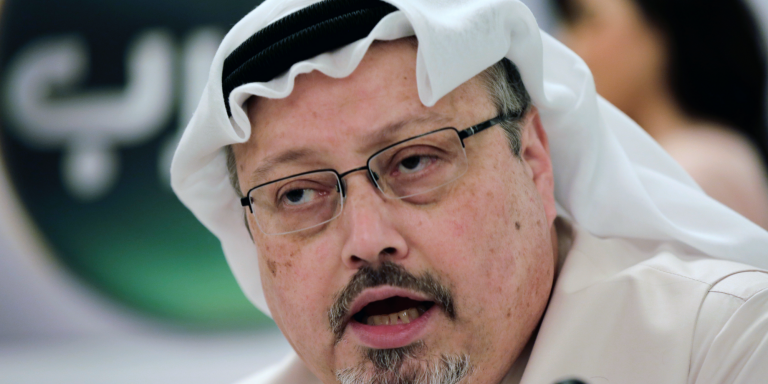INTELBRIEF
January 10, 2019
IntelBrief: Khashoggi’s Life & Death and the Broader Threat to Freedom of the Press

- On January 10, 2019, a bipartisan event in the U.S. Capitol will remember the life of journalist Jamal Khashoggi on the 100-day anniversary of his death.
- Khashoggi’s death was far from an anomaly; 53 journalists died in 2018, a shocking 34 of whom were targeted for murder in reprisal for their reporting.
- It is not just in repressive regimes where journalists are now targeted; freedom of the press in the U.S. is under assault.
- The remembrance for Khashoggi calls to mind American values of liberty, justice and giving a voice to the voiceless while holding allies and adversaries accountable.
.
According to the Committee to Protect Journalists (CPJ), 53 journalists died while covering the news or investigating issues across the globe in 2018. More troubling, 34 of those journalists were murdered because of their work, singled out and targeted by criminals and rogue governments for their reporting. The October 2, 2018, killing of Washington Post columnist Jamal Khashoggi was the most public of these murders, but an additional 33 journalists were silenced for what they reported on and spoke about. By comparison, according to the CPJ, only 18 journalists were deliberately killed because of their work in 2017. Based purely on an analysis of the available data, 2018 was a dangerous year to speak truth to power. And the struggle for power, particularly the desire of tyrants and strongmen to hold on to it at all costs, is in part responsible for this horrifying trend. Indeed, as Lawrence Wright wrote in his tribute to Khashoggi in The New Yorker, ‘suppressing freedom of speech allows tyranny to enlarge its hold on power.’
On January 10, members of the U.S. House and Senate of both parties have organized a remembrance in the U.S. Capitol to mark the 100th day since Khashoggi was murdered and to highlight the growing attacks on journalists -- and to support the fundamental concept of a free press. The problem facing journalists today is hardly new; some high-ranking members of government and industry have always maintained a cantankerous disposition toward a free press, especially those working to unearth corruption, malfeasance and other abuses of power. But the animosity toward the very notion that a democracy depends on a free press is unprecedented and is prevalent now at the highest levels of U.S. government. President Trump routinely labels the media ‘the enemy of the people,’ a term most closely associated with the reign of former Soviet dictator Josef Stalin. More troubling, many of the President’s closest supporters, including the senior elected officials in government, echo and amplify his disdain for a free press, equating criticism with disloyalty and treason.
It is not entirely uncommon for a sitting president to maintain a contentious relationship with the press, but until now, no American president has publicly and repeatedly labeled all but the most sycophantic coverage as ‘fake news’ and ‘the true enemy of the people.' Even after the June 2018 murder of five journalists and employees of the Capital Gazette newspaper in Annapolis, Maryland, and the mail bomb campaign against numerous high-profile members of the media, President Trump continued to disparage members of the media as ‘the enemy.' As recently as January 7, the U.S. President tweeted ‘The Fake News Media in our Country is the real Opposition Party. It is truly the Enemy of the People. We must bring honesty back to journalism and reporting.’ The inflammatory rhetoric spouted from the most powerful bully pulpit in the world has real-life consequences. The tactic of denouncing the media has not gone unnoticed by autocrats abroad, including Russia’s Vladimir Putin, who has deployed the phrases himself to discourage transparent attempts to report on the Kremlin’s vast disinformation campaign.Unless steps are taken to reverse the mainstreaming of demeaning the work of journalists, and the foundational concepts of a free press, the U.S. and other western democracies will continue to become increasingly hostile to critical reporting.
The targeting of a free press is more than the killing of journalists. Intimidation and imprisonment are much more common. A December 2018 Reporters Without Borders report noted that 348 journalists were being detained at the end of 2018, compared to 326 in 2017. Under President Erdogan, Turkey has ranked among the worst governments concerning the systematic intimidation and imprisonment of reporters. Just five countries—Turkey, China, Iran, Saudi Arabia, and Egypt—are detaining half of the total number of imprisoned journalists. In other countries, including Pakistan, dissenting voices have been forced to flee the country and remain fearful of retribution, even while living in self-imposed exile. The remembrance of Jamal Khashoggi at the Capitol is as much about celebrating his life and indefatigable quest for truth as it is about remembering him on the 100-day anniversary of his death. More broadly, the remembrance symbolizes the dire need for the United States to focus on its core values of liberty and justice, which can only be achieved by helping those seeking to give a voice to the voiceless, while simultaneously holding allies and adversaries accountable for unspeakable acts and miscarriages of justice.
.
For tailored research and analysis, please contact: info@thesoufancenter.org
[video width="960" height="540" mp4="https://thesoufancenter.org/wp-content/uploads/2019/01/IB-0110.mp4" poster="https://thesoufancenter.org/wp-content/uploads/2019/01/Screen-Shot-2019-01-10-at-11.28.21-1.png"][/video]